Nepal is one of the most diverse countries I’ve ever visited, and therefore, has a myriad of customs and etiquette. As a tourist, it can be a little confusing at first. The important thing to know is that Nepali people are very relaxed. Although the items listed below are strictly followed by Nepalese, they don’t expect tourists to get everything right. Nepal is a very tolerant country, so as long as you show respect to locals and be polite, they’ll be happy. That being said, I do think it’s good to understand the culture and what is considered polite and rude before visiting. Here are some Nepal customs, traditions, and etiquette to be aware of prior to visiting.
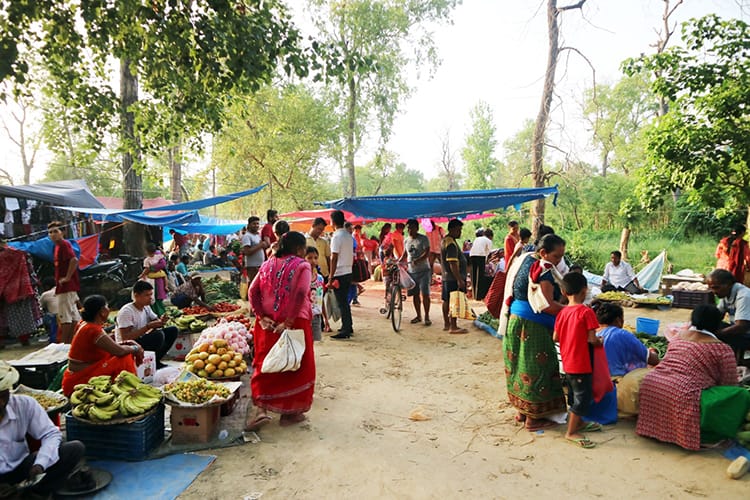
Greetings in Nepal
Learning to greet people in Nepali is one of the easiest ways to show respect within the country. Locals will appreciate the gesture, and you’ll find them even more welcoming.
Formal Greeting
The traditional greeting in Nepal is, “Namaste.” Translated, it means, “The light in me honors the light in you.” It should be said while putting your hands together in front of you as if you were about to pray. The higher you raise your hands in prayer, the more respect you are giving. The highest amount of respect is shown by placing your thumb between your eyes while having prayer hands. This is usually reserved for your elders or someone you respect a great deal. Prayer hands can also be used when saying thank you or goodbye.
Informal Greeting
While “Namaste” is the traditional greeting, it’s actually too formal for the phone. I was startled when all of my Nepali friends answered their phones, “Hello.” If you need to call someone in Nepal, you do not need to greet them with “Namaste.”
Hand Shake
If you are sitting in a group with locals, it’s considered respectful to shake everyone’s hands as you greet them. I find this more often with male groups. Back home in America, you just say a quick hi to everyone, but in Nepal, you greet each person individually.
Always Start With “Hello”
Before traveling, I spent a decade of my life in New York City. I’m in the habit of jumping to the chase because most New Yorkers will walk away if you say “Hi, how are you?” before asking for directions. In Nepal, it’s polite to say, “Namaste” prior to asking for help. To this day, I still have trouble remembering this because I don’t want to waste people’s time.
“Have you eaten?”
When I first arrived in Nepal, I thought it was so strange that after saying hello, people would ask me, “Have you eaten?” I thought it was a language barrier and they were asking if I was hungry and wanted to go grab food. “Have you eaten?” is the same as “How are you?” In Nepal, having eaten means you’re good and healthy. You can simply respond “Yes, and you?” If you say no, you’ll be rushed to a restaurant and/or someone’s home. They’ll probably show concern and offer you as much food as you can eat.
Respectful Terms
It’s common for people to refer to each other as family. For instance, many of my friends call me “Didi” or “Baini.” This means “big sister” and “little sister.” While I’m not actually related to anyone in Nepal, it’s a form of respect. Likewise, I refer to my friends in Nepal the same way. You won’t be expected to use these words, but you will be shown more respect if you take the time to learn them. I also find this highly confusing because I never know when I’m meeting someone’s “brother” or their actual brother.
Baba – Father
Amma – Mother
Dai – Big Brother
Didi – Big Sister
Bhai – Little Brother
Baini – Little Sister
Babu – Baby Boy
Nanu – Baby Girl
Remove Shoes
When entering someone’s home, it’s expected that you remove your shoes. This will also be expected in some restaurants and in temples.
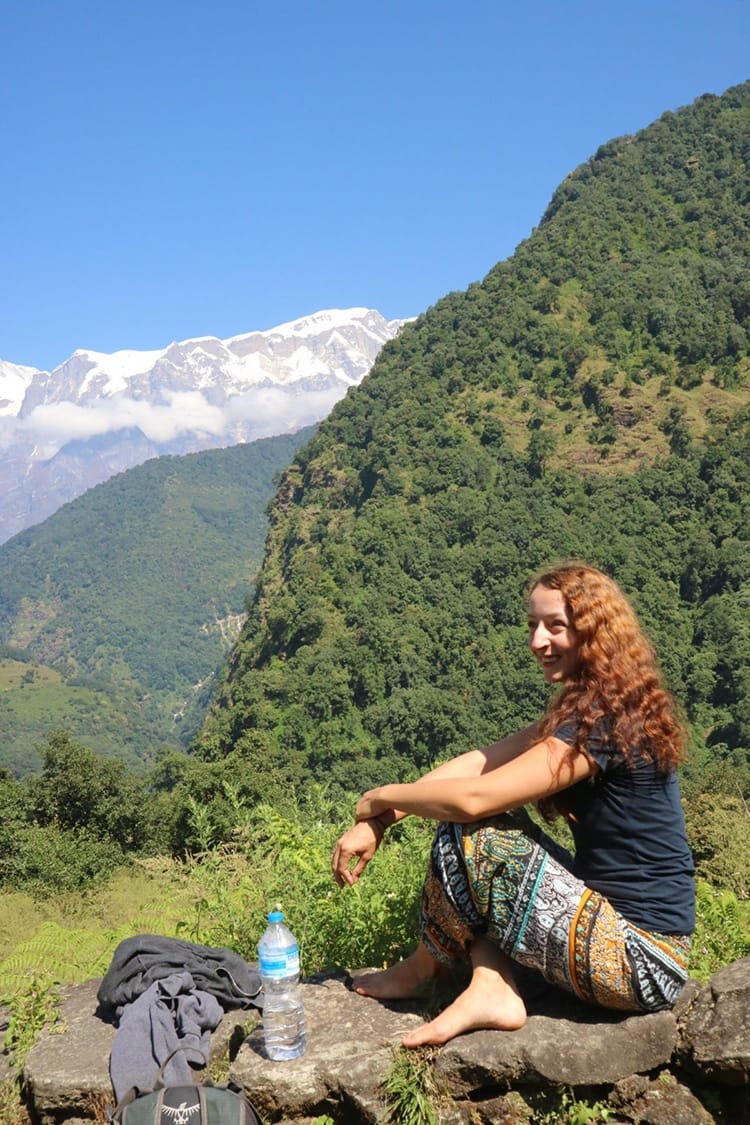
Nepal Customs & Etiquette for Body Parts
This whole topic will sound very strange to most Americans, but certain body parts are considered sacred and others are considered dirty. And not in the way you would think.
Right Hand vs Left Hand
Most locals in Nepal do not use toilet paper. Instead, they wipe themselves with their left hand. Because of this, the left hand is considered dirty. If you are handing someone something, you should do it with only your right hand as a sign of respect. If you are eating with your hands, you should only use your right hand or you will get some very strange looks.
Nepal Customs for Feet
Touching someone’s feet can be good or bad in Nepal. Say you are sitting on the floor in a group. If you move and your foot brushes against someone else, that’s considered rude because feet are the dirtiest part of the body. If a local accidentally touches you with their feet, they will lightly touch your shoulder/arm and then their own head. It’s like a non-verbal way of saying, “forgive me.” I once did this to a Nepali friend, and he couldn’t stop laughing because he’d never seen a westerner do it.
On the other hand, touching someone’s feet can be the ultimate sign of respect. If you bow down and kiss someone else’s feet, it’s a very sincere gesture showing your love and respect. I watched an open air cremation at Pashupatinath Temple, where the son kissed his late father’s feet just before the fire was lit. It was such a pure moment that I began to tear up.
Nepal Customs for Heads
A person’s head is considered sacred and therefore should not be touched. Coming from a culture where we touch each other’s heads without thinking about it, I’ve probably insulted more than a few people this way. At first, I thought Nepali people were just very particular about their hairdos. Now, I know it’s highly unusual for someone to touch their head, and therefore, it feels too personal.
Skintone & Hair Color
If you have light skin or blonde hair in Nepal, you will probably attract a lot of stares in small villages and sometimes even in cities. You look different, therefore you stand out. It’s important to note that people are just very curious about you and are not trying to be rude. It’s very hard to get a visa to another country if you are a Nepali citizen. A large portion of people in Nepal have never left the country, and some have never seen foreigners. Be open and smile at people. I find people typically just want to know where I’m from, and what it’s like to live there. You’ll also be asked for photos every once in a while.
Nepal Customs & Etiquette for Money
Bargaining
Bargaining in Nepal is acceptable. It’s actually expected most of the time. Just be sure to be polite about it. If you’re not sure how to negotiate you can check out my how to guide for negotiating.
Right Hand
As mentioned above, you should always hand money with your right hand. Using your left hand is insulting. Nepalese people know that tourists use toilet paper and that they don’t mean to be rude by using their left hand. But, I still adjust and use my right out of respect. I even catch myself doing it in the states now.
Tipping in Nepal
Tipping is customary in Nepal. Nice sit down restaurants will usually add a 10% service fee to the total in addition to a 13% tax. For street food, you can simply leave the change. Guides will expect a 10% tip. Porters will expect a 5% tip. Taxis do not get tips unless they are using the meter (but they never use the meter for tourists). You can read my post about how to tip in Nepal.
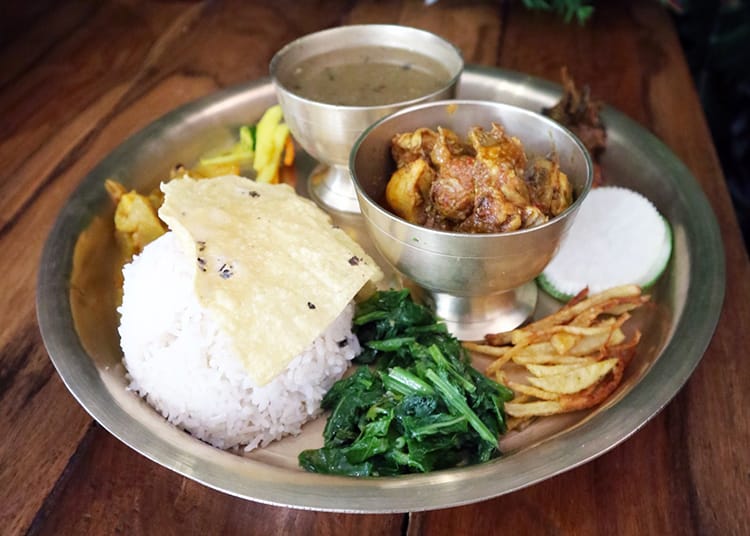
Nepal Customs & Etiquette for Food
Dal Baht
Dal baht is a traditional Nepalese dish. It consists of a large plate with white rice and a side of lentil soup. Usually it will also come with a vegetable curry (typically potato or pumpkin), a meat curry (buffalo, chicken, mutton, etc.), and a green similar to spinach. You might also get a spicy chutney and some spicy pickled vegetables. This dish is typically eaten with the right hand and has unlimited refills (even in restaurants). Locals generally eat dal baht twice a day. It’s very filling and it’s cheap.
Lunch and Dinner
I always have to adjust when I go back to Nepal because people eat at very strange times. Most locals will have a light breakfast when they wake up. Typically, this will be chapati and tea. Then, they’ll eat lunch at 11am. Most of the time, lunch will be dal baht or something similar. But, they won’t eat dinner until 8pm (sometimes later). My Nepali friends always make fun of me for eating so early. It wasn’t until I stayed in Nepal for a few months that I realized they have “snacks” around 4pm or 5pm. I consider a snack to be an appetizer or something light. In Nepal, a “snack” is basically another meal. For example, you might have curried chicken, rice, and some uncooked cucumber, radish, and onion.
Nepal Customs for Wasting Food
Wasting food in the western world doesn’t seem like a huge deal, but Nepal is heavily driven by agriculture. A large percentage of the population are farming land, raising livestock, or working with fisheries. Since so many people within the country know how hard it is to harvest food, they aren’t wasteful of those efforts. Literally, none goes to waste. Locals will eat every grain of rice on their plate. It’s really made me rethink food and waste.
No Sharing
Once you touch the food on your plate, it is considered contaminated and cannot be put back. Often, I’m given a giant portion of rice and I’m unlikely to finish it. Before even touching my plate, I ask for a second clean plate and use a clean spoon to move the rice over. That way, I only have what I KNOW I can eat on my plate. If I’m still hungry, I can take more.
Ask for Seconds
Once you’ve finished your entire first plate, it’s customary to have seconds. This can get a little bit tricky because taking seconds is a compliment to the chef, however not finishing your food is bad. This is why I keep a second plate for the rice I know I won’t eat. I also take very small portions on the first round of food. When seconds are offered, I always accept a little bit of a few items.
Declining Food
Turning down food or tea is customary even if you want it. This makes it difficult to actually turn down food or tea because your hostess will ask you several times while assuming you’re just being polite. Often, she’ll still serve you after you’ve said no. I find that rubbing my belly and saying “full” will get the job done. But don’t be surprised if someone really pushes you to have more food or tea.
Slurping
Speaking of tea, slurping is acceptable. If tea is hot, you can slurp to cool it down. I have to adjust to this whenever I return home since it’s considered rude in the U.S.
Being “Skinny” or “Fat”
I’m always amazed at how upfront people are about your weight in Nepal. It’s not considered rude there. I’ve been called “skinny” a lot in Nepal and not in a good way. Being called skinny can be insulting. I’ve had a lot of Nepali moms offer to fatten me up because I look unwell. On the other hand, being “fat” isn’t necessarily a bad thing. Nepali women have curves and being a little fuller is beautiful. It means you eat well, which means you probably have money. Whereas in the U.S. being skinny means you can afford a gym membership.
Ketchup?
I was super offended the first time I ordered fried noodles and ketchup was brought out with it. I get it, people think Americans put ketchup on everything. One of my friends, who is an Aussi, also got offended because he’s not even American. Little did we know, Nepali people LOVE ketchup, even on their fried noodles. So, if you’re served ketchup, it’s not based on a stereotype of westerners.
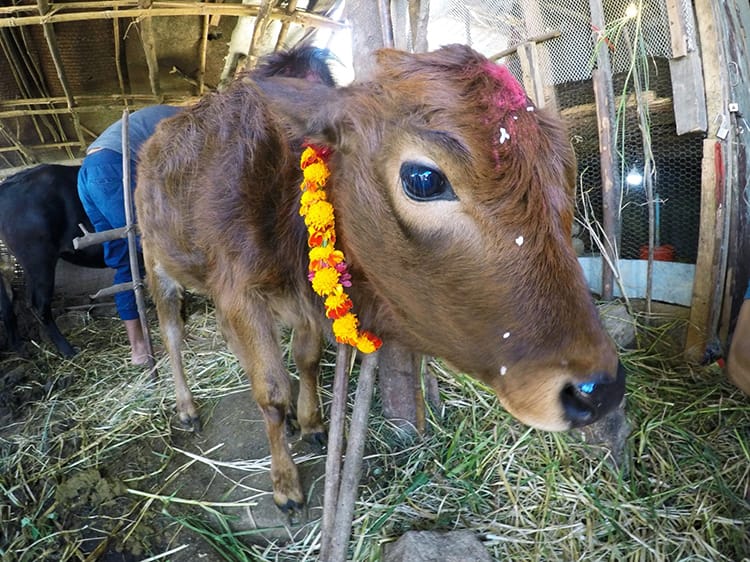
Nepal Customs for Temples & Religion
Religion
There are several religions throughout Nepal, however the majority of the population are either Hindu or Buddhist.
No Photos
Certain temples do not allow photography. Please be mindful of this as you’re walking around.
Dress Modestly
Nepal is a modest country, however tourist areas and cities are more laid back. If you’re wearing shorts around Thamel, that’s okay, but be sure to change into something appropriate before entering places of worship like Durbar Square. I like to keep a sarong in my daypack to wrap around me like a skirt or to cover my shoulders when necessary.
I can’t stress this enough. If you are a woman wearing shorts, please make sure your butt isn’t showing. Same goes for dresses. In Nepal, most women don’t even show their knees, so showing your butt is extremely disrespectful. I only say this because I’ve seen it a few times and am always so caught off guard. Respect the culture of the places you are visiting.
Non-Believers
Non-believers are not allowed into certain Hindu temples. Please respect this rule as they believe that non-believers will pollute the temple. These temples will be very clearly marked. For instance, there is one main temple in Pashupatinath that only allows Hindus.
Walking Clockwise
In Buddhism, it’s expected that you walk around temples in a clockwise direction. This will be useful for major temples in Kathmandu like Boudhanath and on trekking routes. It’s also asked that you walk to the left of prayer flags (on large flag poles), prayer wheels, and mani stones.
Beef
Most Hindus do not eat beef, however younger generations and people in cities do. Cows are considered gods within Nepal, and it is actually illegal to kill a cow within the country. Buffalo and yaks are eaten in place of beef.
Lakes & Rivers
Lakes and rivers are considered holy in Nepal. It’s important to note this especially for trekking. If you are going to see lakes on your trek, be careful not to contaminate or pollute them. You should not wash your hands, body, or laundry in them unless it is part of a religious pilgrimage.
Shoes and Feet
You must remove your shoes before entering a temple. You’ll usually see signs requesting this. It’s also important to note that it’s considered rude to point your toes at Buddha or gods. So, if you decide to sit in front of a Buddha statue, you should direct your feet off to the side or sit cross legged.
Relationships in Nepal
Holding Hands
Something that foreigners (especially Americans) find strange about Nepal is that male friends will hold hands, kiss each other on the cheek, and wrap their arms around each other in public. In American culture “bros” just slap each other on the back or give a fist bump. Showing affection for someone of the same sex isn’t viewed as “being gay” and there’s no negative connotation in Nepal. On the other hand, couples will rarely hold hands or show affection in public even after being married.
Arranged & Love Marriages
Many foreigners believe that marriages in Nepal are all arranged. Today, “love marriages” are also very common. Arranged marriages are slowly loosing popularity. Divorce is also on the rise in Nepal as women are becoming more independent.
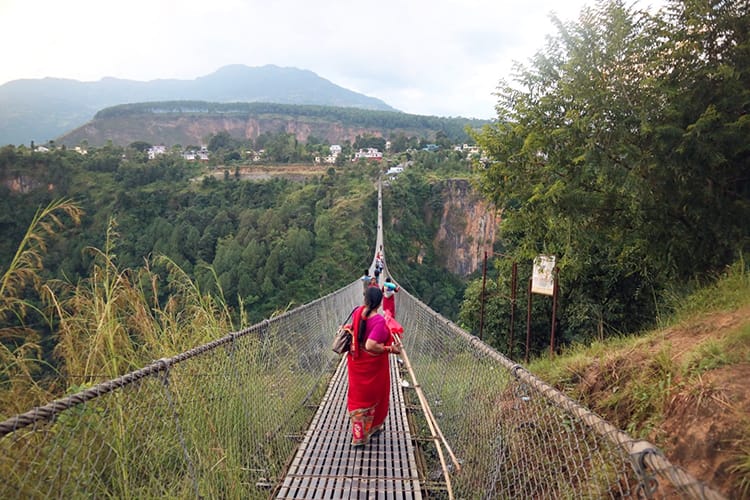
Women Traveling in Nepal
Don’t Curse
In Nepal, women don’t curse. Or at least they don’t curse in public. Despite this, my Nepali friends think it’s hilarious to teach me bad words and then ask me to repeat them at parties. Just be careful if you’re in a public place.
Periods
There are a lot of rules around having your period in Nepal. For instance, you are not supposed to enter religious areas like temples and you shouldn’t accept tika (the red dot on the forehead). You’re also not allowed to touch certain items in a kitchen, and you can’t help prepare food. You can read a post I wrote on a glimpse into the lives of Nepali women if you want to know more.
Laid Back Attitude
Ke garne?
“Ke garne?” is one of the most popular sayings I’ve heard in Nepal. Translated it means, “What to do?” Nepali people are insanely laid back and when something goes wrong, you’ll often see someone shrug it off and simply say “What to do?” and move on with their lives. This can be frustrating to foreigners who aren’t as laid back and expect things to work properly. Take a deep breath and try to accept that things will work out eventually.
Nepali Time
A common joke in Nepal is that the people run on “Nepali Time.” This means they are always late. I’ve actually started showing up to things a half hour late because I know most of my friends won’t be on time. When I’m the late one, I use Nepali time as an excuse too, and it usually gets a good chuckle.
Other Nepal Customs & Etiquette
Spitting
This is a random one, but spitting is insanely common in Nepal. Like people spit all. the. time. Just make sure you’re not in anyones spitting path.
Calendar
Nepal has it’s own calendar, therefore you’ll see signs for businesses established in 2072. Currently, it’s 2075 in Nepal. You can also celebrate the New Year a few times each year. Sherpas also have their own calendar and New Year. Most locals can easily figure out what month it is based on our calendar, however, if you ask someone the day and they look a little confused, they are probably working it out in their head.
Have any questions about Nepal customs or etiquette? Leave a comment below!
You might also like…
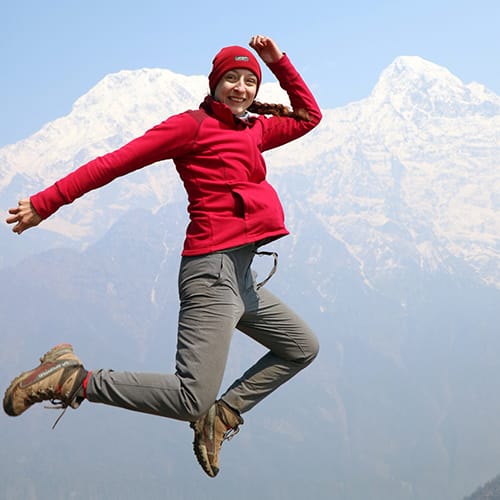
Michelle Della Giovanna
Writer at Full Time Explorer
I’m just your average New Yorker who quit her job in the fashion industry to explore the world. Come find out what it’s like to trade in five-inch heels for squat toilets.
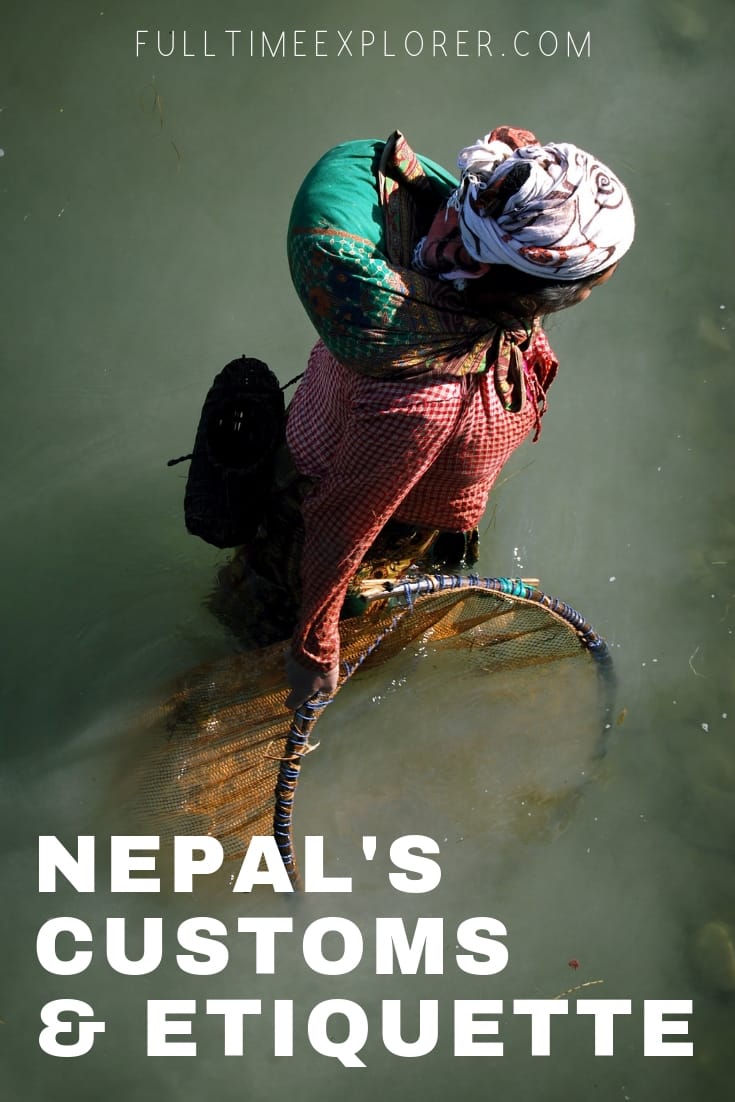
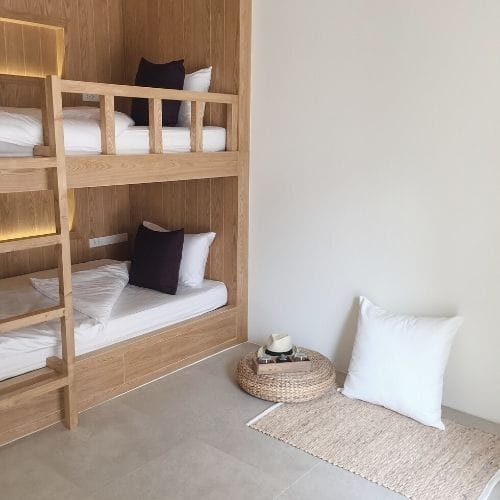

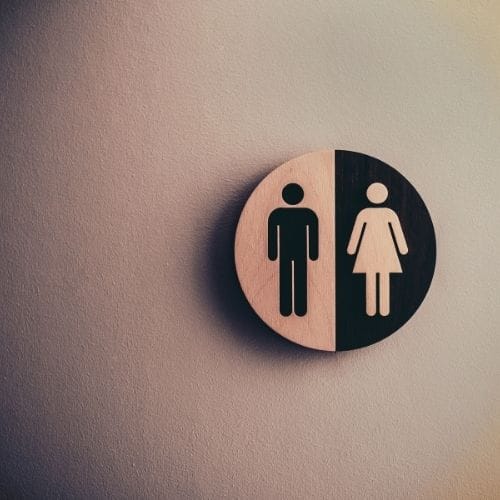
Thank you so much for the excellent information! I was wondering if you could tell me more about taking your shoes off in someone’s home — is is then okay to have bare feet? Or should one have socks on? Also, I will be working some in a school or child care center — do you happen to know if it’s okay for women to wear sandals in such environments? Will we take our shoes off there as well? It would seem strange to be working in a school with bare feet but I’m quite clueless at this point.
Thanks so much for your insight!
Hey Susie! Great questions. Most homes have “slippers” which are like indoor sandals. You can wear them with or without socks. That usually depends on how hot or cold it is. I would recommend bringing a pair of new sandals (like flipflops or the kind with one big chunky strap going across) that are easy to slip on and off. You can keep them separate for inside use and take off your regular shoes at the door. As for the school my boyfriend just told me that they could wear shoes in all the rooms except if they had carpet and they also couldn’t wear shoes in the computer room haha hope that helps!
Thanks so much! I found all your tips and info super helpful!
Hello Michelle,
Thank-you so much for all the good information. I’ve read many of your pages and all have been very informative and well written.
A question on religious etiquette. I’m not Hindu or Buddhist; but I am very dedicated to my own. As such, I would really prefer not to participate in such rituals like Puja ceremonies or spinning their prayer wheels. Would locals find that offensive? I do not wish to cause problems, but I need to be true to my own beliefs as well.
Thank-you!
Mark
Hello Mark,
Thanks for your message. Typically, people are not invited to participate in puja ceremonies unless they are family. The main reason travelers may be asked if they want to do a puja is if you are doing an expedition to a mountain peak. This kind of puja is to ask the gods in the mountain for permission to pass. If you are doing an expedition, you are required to have a guide and you could politely explain to them or the tour company that you don’t want to participate in advance. This doesn’t happen on treks (only expeditions).
Spinning the prayer wheels is a choice so no need to worry there. Many people pass them without spinning them.
Nepali people are very tolerant and do not force their religion on anyone so if you are respectful and decline politely you won’t offend anyone.
Hope this helps and I hope you have a wonderful time in Nepal!
I found your blog yesterday and I never read blogs, but yours is so good! Really helpful and relevant advice and tips. Thanks so much for taking the time to put all of this together????
Thank you so much! I’m so happy you found it helpful!
Hello there,
As a Nepali myself, I feel really proud that foreigners have such wholesome ideas about and on Nepal and Nepali. There are so many hilarious remarks like “K GARNE” and Nepali time. I had a good laugh. Yeah Nepali people are really laid back and carefree. even during the hardest time we just say “Laaa” (damn) and just move on. For Foreigners, this might leave you in surprise or you might even think of us as “unserious”. But ofcourse, all of us has different approaches to problem solving and decision making. If you find yourself in this settings, do not panic. Things WILL get done for sure. Nepali are so used to failures and unfortunates that we always have 2/3 backup plans and that too, fully prepared. So please dont panic when you got into such situations.
Also, about the beauty standard, you dont need to feel insecure about any of your body parts. People here in Nepal likes foreigners no matter how different you look. We just LOOOVEEE foreigners. Yeah you might get some comments on your physical appearance but that does not stop us from admiring you all. If you get stared at a lot, dont thinks thats because of your height, weight, colors or your facial physical. THATS JUST BECAUSE YOU ARE A FOREIGNERS. OUR BELOVED FOREIGNERS. YOU GUYS ARE LITERALLY ANGELS FOR US AND YES IM NOT EXAGGARATING. We are literally whipped for foreigners TT. Im so sorry if we make you feel uncomfortable.
Well done! I enjoyed reading all that, thank you la
Few more points…:
If I visit private homes, how long is polite to stay? Few days..?
How to contribuite other than bringing sweets? What about giving money?
Ps we foreigners also totally love Nepal and Nepali….🙏✨
Hello,
It’s hard to saw how long to stay. It depends on your relationship with the person and what feels comfortable.
For contributing, usually it’s best to bring food. If it’s friends, it would be weird to offer money. We normally bring food which we can be cooked when we arrive. Even fresh fruits and vegetables are good. If they eat meat, then you can bring some meat to cook there.